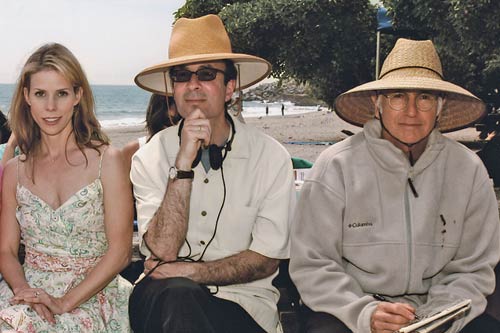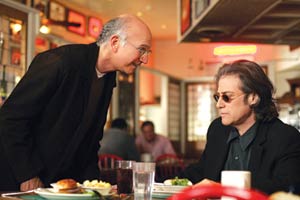By BOB WEIDE
 THREE OF A KIND: Bob Weide (center), Larry David and Cheryl Hines
THREE OF A KIND: Bob Weide (center), Larry David and Cheryl Hines
contemplate the meaning of life. (Or maybe not.) (Photo Credit: HBO).
A lot of comedy series are incorporating improvised dialogue now, a trend seemingly started by Curb. How was the decision made to improvise the dialogue?
When HBO saw the rough-cut of the original special, they sent us a memo asking if we could possibly "improve" the dialogue. Because we didn't read the memo too carefully, we re-shot the entire show, mistakenly thinking were we addressing their note. The rest is history.
Once we started the series, the decision to stick with improv came out of laziness. Let's face it: if you're writing scripts, you're going to be up till 2 a.m. in a room full of hygienically-challenged writers, trying to break stories and write jokes while eating cold pizza out of cardboard boxes. Instead, we all get to go home to our wives at a reasonable hour. Sometimes, we even go home to each other's wives, and outside of the improvement, nobody knows the difference.
Isn't that last line stolen from Groucho?
Next question.
Since you've provided the segue, how did your experience as a comedy documentarian prepare you for directing the original Curb special, and later, the series?
Larry called me in the fall of '98, saying he was going to return to the clubs to do standup for the first time in nine years, and asked if I would film it as a documentary. My past subjects had included the Marx Brothers, W.C. Fields and Lenny Bruce, among others, so I reminded Larry that I was used to working with dead people. He felt that qualified me because he was emotionally moribund. After making a mad dash for my dictionary, I agreed to take the gig.
The special was a hybrid between genuine and faux-documentary. Larry really did perform in the clubs and that footage provided sort of a spine for the storyline. But the offstage story was fabricated, with actors playing his wife (Cheryl Hines), his manager (Jeff Garlin), etc. So even though we created this bare bones story outline, I basically shot the special as if it were an actual cinema vérité documentary. The end result seemed so authentic that many viewers thought the whole thing was real. In fact, Cheryl had family friends in Florida who called her parents asking why they weren't told that she had married a Hollywood big shot.
Once we started shooting the series, the special served as a template. But over time, I relaxed the rules of vérité filmmaking and eventually approached the scenes with fairly traditional single-camera coverage, albeit always handheld. In five years on the series, I've used a dolly maybe four times, a jib twice. On the opening episode of the current season, I had a techno-crane for half-a-day. That was a big deal.
The show sounds pretty low maintenance. Is your budget relatively small?
Our budget is ample, but very little is actually spent on production. Most of the money winds up lining the pockets of the fat cats.
What fat cats?
I don't know. I've just always wanted to blame something on fat cats. Actually, Curb does cost less than most HBO programming, but the savings are passed on to the viewers. That's why HBO subscribers pay less for Curb than for other HBO programs.
Is that true?
I don't know. I pirate all my cable. (laughter...then a loud, viscous coughing fit...muffled sounds of a frantic phone call...ambulance sirens, then two-and-a-half hours of silence. Finally, conversation resumes.)
 INDIGESTION: Larry David (left) and his favorite foil, Richard Lewis.
INDIGESTION: Larry David (left) and his favorite foil, Richard Lewis.
(Photo courtesy HBO.)
How does your love of classic film comedy inform your work as a director on Curb?
Larry has an aversion to anything that looks "directed," so I have limited opportunities to exercise any real directorial flourish on Curb. (Unlike my current network pilot which promises to be all flourish and no content.) But if you think about some of the comedy directors from the Golden Age, few would be considered auteurs, let alone household names: Eddie Sutherland, Clyde Bruckman, Leo McCarey, Norman McLeod. Those Marx Brothers/Keaton/Fields/Laurel & Hardy films didn't direct themselves. But those directors weren't trying to put their stamp on anything. They were creating an environment for great comic artists to do their thing. On Curb, I've learned when to impose myself on the material, and when to just give actors a wide berth. Of course, because of the improvisation, I'm always huddling with Larry and the actors between takes–discussing what's working and what's not–and exploring alternate directions for the scene. So in some ways, you're not only directing, but writing on the set. Of course, that process then continues in the editing room.
How much is the real Larry David like the Larry David in the show?
Both Larrys are exactly the same, except the real Larry has a full head of hair. He acts bald on the show because any comedian knows that bald is funny.
Can you divulge any secrets regarding upcoming storylines for the current season?
Sure, here's your exclusive: In Season Five, Larry will say and do things that will be misunderstood by people who will get very irritated with him. His troubles will snowball and comedy will ensue until everything blows up in his face. Then Nate Fisher dies.
(unintelligible)
(unintelligible)...usually a forty-two regular, but it varies, depending on the cut.
Not that anyone really cares, but what are your future plans?
Movies, from here on out.
You'll be directing movies?
No, watching them. Curb has taken up so much time that I have a lot of catching up to do. I understand they're making them in color now.